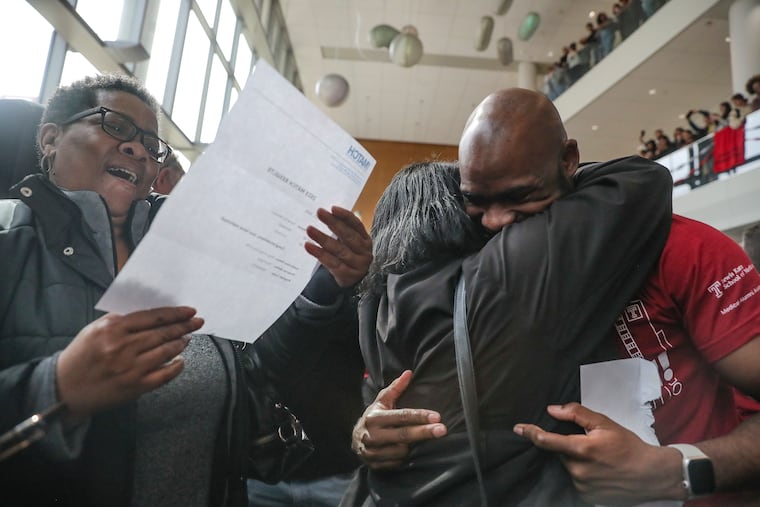How to support the next generation of Black Philly doctors
The Medical Society of Eastern Pennsylvania, a historically Black group, is collecting donations and promoting Amazon wish lists to make sure soon-to-be doctors receive support.

The patient was having a manic episode, one of the doctors suggested. They were speaking quickly and at a higher pitch, and could be in distress. But Demetrius Woodard, the medical student working alongside them, wasn’t so sure.
“In Philadelphia, most people usually talk pretty fast, especially if you’re from South Philly [or] Southwest,” he said about it now with a smile. Woodard grew up in Southwest Philly and will graduate this spring from Temple’s medical school before beginning a psychiatry residency at Penn. He explained to the doctors that he had spoken with the patient earlier in the day and that this was probably just a cultural difference.
“We’re [often] not really getting a whole context of a person. And that’s something that I really want to work on in the field,” he said.
Woodard is one of many Black medical students soon making that transition from student to doctor. But it comes at a significant cost; a medical school graduate has an average debt of $200,000 for a medical degree alone. During residency, the training period after medical school, doctors usually make somewhere between $60,000 and $80,000 depending on their specialty, while working up to 80-hour weeks.
» READ MORE: On Match Day, Temple med students learned where they’ll spend their residency with tears, hugs, and sighs of relief
Expense is one of the reasons why only about 5% of doctors in the United States are Black, and there is roughly the same proportion of Black male doctors today as there were in 1900.
While systemic racism is at the root of why Black people are underrepresented in one of America’s most lucrative and respected career fields, expense is one manifestation of that root. To many Black people, the costs of a medical school education are prohibitive.
The Medical Society of Eastern Pennsylvania (MSEP) is trying to lighten that load. The historically Black organization is collecting donations for Philadelphia’s Black graduating medical students as they take the next step in their careers, under the #BlackPhillyMedGradWishlist campaign.
Safiyya Shabazz, a physician and MSEP president, said that a couple of years ago she saw graduating medical students posting their Amazon wish lists on Twitter.
“I was so excited about it,” she said. “And I just happened to have gotten a bonus around that time. I was sending random gifts to random people. It made me feel great and I was just so proud of them.”
Shabazz thought the MSEP ought to help organize the same kind of campaign for Black Philly grads, so they feel supported and celebrated as they become doctors.
“We need to make it a great thing for people to come and stay [in Philadelphia], particularly those underrepresented experts to come and stay and serve in Philadelphia,” she said. “We could do more to keep that talent here.”
From now until April 15, donors can support the participating graduates two ways: by making a tax-deductible donation to the MSEP, where 100% of the money raised will be split evenly among the graduates, or by donating directly to individual graduates through their Amazon wish lists or CashApp. The donation form and the links to individual graduate profiles are accessible on the MSEP’s website.
» READ MORE: How do we improve diversity in medicine? Black female physician-leaders answer
“A lot of students, we get our last student loan reimbursement around March, and then residency starts in late June, early July, but we don’t get our first paycheck until mid-July,” said Shofolahan Da-Silva from the Philadelphia College of Osteopathic Medicine, who will begin a residency in anesthesiology.
The residency essentials on nearly every student’s Amazon wish list include scrub sets and comfortable sneakers for the hospital, stethoscopes and other medical tools, and study books for their board exams still to come. But life is about more than just the essentials; some also asked for Instant Pots, Starbucks gift cards, AirPods, or a Peloton bike, if you’re feeling generous.
“You need to have money to successfully do medical school or to successfully pursue medicine,” said Bryson Hoover-Hankerson, from Temple’s medical school.
“They don’t explicitly say, ‘This is not for poor people’ or ‘This is not something [for] Black people from underserved communities,’ but good luck trying to successfully complete medicine without appropriate help.”
Hoover-Hankerson said that alleviating some of those costs and getting more Black people into medicine are crucial. He didn’t meet a Black physician until he was 20 years old, and said that lots of people in his family don’t trust doctors, in part because they rarely see doctors who look like them.
“My mother would tell me all the time, ‘Oh, you’re becoming one of them,’” he said. Hoover-Hankerson’s residency will be in internal medicine, where establishing relationships with patients is especially valuable. He hopes that, as a doctor, he can help Black kids see themselves in the same place.
“Having the trust is really important. So if you can relate to where somebody’s coming from or they can identify [you] and you feel tangible and real to them, that definitely helps erode the barriers.”